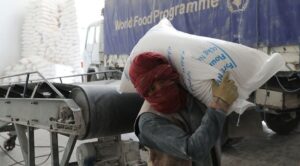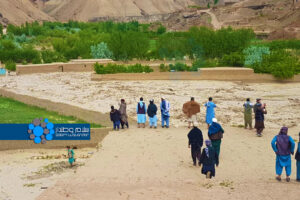KABUL (SW) – Salam Watandar’s research from interviews with 22 child labor girls shows that due to economic problems and lack of a guardian, these girls have been forced to do hard work and peddling on the roads of the capital, Kabul.
They say they were biometriced by the caretaker government but they have not received any help yet. These girls report not receiving help, while according to them, the caretaker government forces prevent them from working on the roads. The child laborers interviewed in this report are between 6 and 15 years old.
Most of these girls say that after the political changes two years ago in the country, economic problems and poverty have increased and this has forced them to work on the roads.
10-year-old Kausar, a resident of Kabul city, who sells chewing gum on the side of the road, told Salam Watandar that since two years, due to the increase in poverty, she has been forced to work alongside her father and brother. She adds: “Since the arrival of the Islamic Emirate, he has been unemployed. For this reason, since the arrival of the Islamic Emirate, I have been selling chewing gums until now. There is no work, at that time I was working for 150 to 200 afghanis, now I work for 70 to 80 afghanis. There are seven of us at home, my father polishes boots.”
Nine-year-old Kainat, who sells artificial jewelry in the “Parvan Hotel” area of Kabul city, says her father is disabled and for this reason, she has been hawking on the city streets since one year. This child adds: “It’s because of poverty, I came here out of necessity and I sell balloons. I earn 100, 200 to 300 afghanis a day. My father also works. I’m leaving, I haven’t eaten bread yet, I might take something home to eat.”
These female child laborers say that the government forces transfer them to the correctional center of the prisons regulation department while working on the roads and release them after biometrics. According to her, they were advised not to work on the roads during biometrics. These girls added that they hoped to receive help after biometric registration so that they no longer have to work on the roads. But so far they have not received any help. They emphasized that they work mostly in secret because the forces of the caretaker government prevent them from working and transfer them to the correctional center of the prisons affairs administration.
13-year-old Hamida, who sells chewing gum on “Deh-Afghanan” road in Kabul city, says that her father is disabled and her mother also has back pain, that’s why she has to work. But the caretaker government forces prevent his work.
Hamidah added that she was transferred twice by the forces of the Islamic Emirate to the correctional center of the prisons affairs administration, and once more she was biometrically registered. She said: “The forces of the Islamic Emirate take us and locks us. They tell us not to come to work anymore. We are not left to work in the streets.”
11-year-old Khadijah, who is a roadside peddler at Barki intersection in Kabul city, says that she studied until the fourth grade. But when she lost her father two years ago, she left school and started working on the roads. She asks the government not to hinder her work and let her continue her work to find a livelihood. Khadija added: “I haven’t worked now, the forces of the Islamic Emirate don’t leave me to work, they lock us up. We were biometricked but they have not helped. We don’t ask for help from the government, we just want them to let us stay and work.”
At the same time, women’s rights activists say that the increase in unemployment, poverty, and the ban on women’s work are factors in the spread of poverty in families, and they say that as a result of poverty, children have been forced to do hard work.
They accused the government of not having support programs for poor families and say that if the government prevents women from working, at least it should start support programs for needy and orphaned families.
Karima Rahimyar, a women’s rights activist, says in this regard: “Men and women cannot find work, their jobs have been taken away. This is the main reason why their young sons and daughters are working on the streets. The other thing is that I have never seen women and girls do any work and it is in their policy.”
Hamira Farhangyar, another women’s rights activist, says that when poverty becomes widespread and severe, poor family members are forced to sell or beg on the streets.
She added: “When a family faces poverty and misery, it has only two options; either she goes out on the road and asks people for good deeds or they use the very little facilities that are in their hands. Nowadays, you can see that most of the young girls who have seen the closed gates of the schools have turned to peddling. Only in their hands is a pen or a mask or a tissue paper box to sell.”
We tried to include the statistics of working children in this report to get information about their increase or decrease but none of the governmental and non-governmental institutions had the statistics of working children. Irfanullah Sharafzoi, spokesperson and head of publications of the Afghan Red Crescent Society office, told Salam Watandar that they do not have specific statistics of working girls in the country.
ENDS






